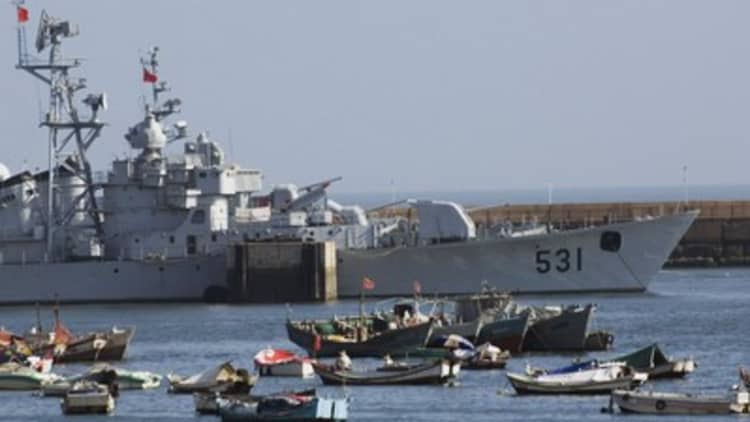An arbitration court in the Netherlands ruled on Thursday that it had jurisdiction to hear some territorial claims the Philippines has filed against China over disputed areas in the South China Sea.
In a legal defeat for China, the Hague-based tribunal rejected Beijing's claim that the disputes were about its territorial sovereignty and said additional hearings would be held to decide the merits of the Philippines' arguments.
The news came as China's naval commander told his U.S. counterpart there is a risk of "a minor incident that sparks war" if the United States continues with its "provocative acts" in the South China Sea, the Chinese navy said on Friday.
The two officers held talks after a U.S. warship challenged China's territorial assertions in the South China Sea on Tuesday by sailing within 12 nautical miles of one of Beijing's man-made islands in the Spratly archipelago.
Admiral Wu Shengli made the comments to U.S. chief of naval operations Admiral John Richardson during a video teleconference on Thursday, according to a Chinese naval statement.
Read More Beijing in uncharted waters as US sails into South China Sea
"If the United States continues with these kinds of dangerous, provocative acts, there could well be a seriously pressing situation between frontline forces from both sides on the sea and in the air, or even a minor incident that sparks war," the statement paraphrased Wu as saying.
"(I) hope the U.S. side cherishes the good situation between the Chinese and U.S. navies that has not come easily and avoids these kinds of incidents from happening again," Wu said.
The U.S. patrol on Tuesday was the most significant U.S. challenge yet to territorial limits China claims around its artificial islands in one of the world's busiest sea lanes.
In the Hague, China has boycotted proceedings and rejects the court's authority in the case. Beijing claims sovereignty over almost the entire South China Sea, dismissing claims to parts of it from Vietnam, the Philippines, Taiwan, Malaysia and Brunei.
The tribunal found it has authority to hear seven of Manila's submissions under the United Nations Convention on the Law of the Sea (UNCLOS) and China's decision not to participate did "not deprive the tribunal of jurisdiction".
The U.S., a treaty ally of the Philippines, welcomed the decision, according to a senior U.S. defense official.

"This demonstrates the relevance of international law to the territorial conflicts in the South China Sea," the official said, speaking on condition of anonymity.
The official added: "It demonstrates that sovereign claims are not necessarily indisputable and it shows that judging issues like this on the basis of international law and international practice are a viable way of, at a minimum, managing territorial conflicts if not resolving them."
State Department spokesman John Kirby told a regular news briefing that in accordance with the terms of UNCLOS, the decision of the tribunal would be legally binding on both the Philippines and China.
John McCain, chairman of the U.S. Senate's armed services committee, hailed the Hague ruling.
"Today's ruling is an important step forward in upholding international law against China's attempts to assert vast and, in my view, questionable claims in the South China Sea," he said. McCain said Washington should continue to support partner countries and allies such as the Philippines in the face of China's assertiveness, including through routine freedom-of-navigation patrols like the one that angered Beijing this week.
Read MoreHow China's military buildup threatens the US
Speaking before Admiral Wu's comments on the recent patrol by a U.S. warship, a U.S. official said the naval chiefs agreed to maintain dialogue and follow protocols to avoid clashes. Scheduled port visits by U.S. and Chinese ships and planned visits to China by senior U.S. Navy officers remained on track, the official said.
"None of that is in jeopardy. Nothing has been cancelled," said the official. Both officers also agreed on the need to stick to protocols established under the Code for Unplanned Encounters at Sea (CUES).
"They agreed that it's very important that both sides continue to use the protocols under the CUES agreement when they're operating close to keep the chances for misunderstanding and any kind of provocation from occurring," said the official.
A U.S. Navy spokesman stressed Washington's position that U.S. freedom of navigation operations were meant to "protect the rights, freedoms, and lawful uses of the sea and airspace guaranteed to all nations under international law".
Bonnie Glaser, a South China Sea expert at the Center for Strategic and International Studies in Washington, called the Hague outcome "a major blow for China given that the opinion explicitly rejects China's arguments that ... the Philippines has not done enough to negotiate the issues with China."
Read More Angry China shadows US warship near man-made islands
The court said it could hear the arguments including one contending that several South China Sea reefs and shoals were not important enough to base territorial claims on. China has been building artificial islands on reefs in the sea and claiming control over the waters within a 12-mile (19-km) radius.
On seven other submissions, including that China had violated the Philippines' sovereign right to exploit its own territorial waters, the court said it would reserve judgment about jurisdiction until it had decided the merits of the case.
No date has been set for the next hearings, which will also be closed to the public.
The Permanent Court of Arbitration was established in the Netherlands in 1899 to encourage peaceful resolution of disputes between states, organisations and private parties. China and the Philippines are among its 117 member countries.

